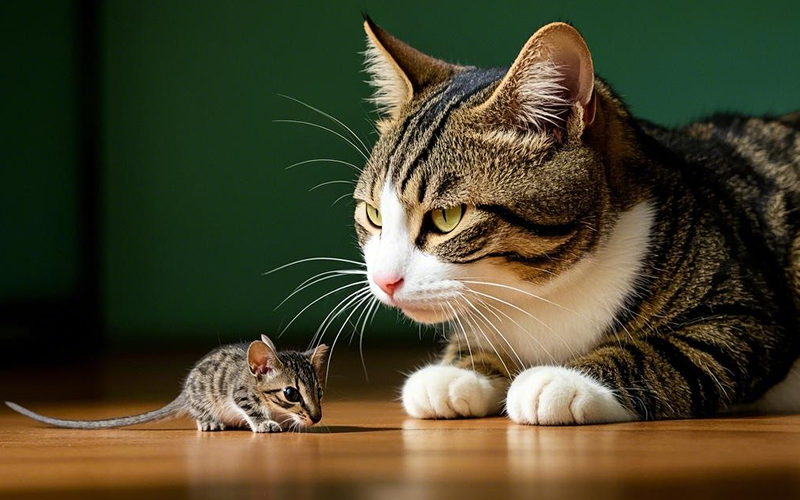Can Cats Eat Rats? Here's What You Need to Know!
- 19 Mar 2025 10:02
Yes, cats can eat rats in the wild, and it’s part of their natural predatory behavior. Cats are obligate carnivores, meaning their diet is primarily made up of animal protein. While it’s natural for cats to catch and consume small rodents like rats, there are some important things to consider regarding the safety and health implications of eating rats.

🐾 Why Cats Eat Rats
Instinctive Behavior: Cats are natural hunters, and their instincts drive them to hunt small animals like rats, mice, and birds. Even domesticated cats may hunt, especially if they have access to the outdoors.
High-Quality Protein: Rats provide high-quality protein and other nutrients, like fat, minerals, and vitamins, that can contribute to a cat's diet if they catch and eat them.
🚨 Potential Risks of Cats Eating Rats
While it’s natural for cats to eat rats, there are some health risks involved:
Parasites and Diseases: Rats can carry parasites (like fleas, ticks, or worms) and diseases (such as leptospirosis, salmonella, or hantavirus) that can be transmitted to cats. Infection from parasites or diseases is a serious concern if your cat eats a rat.
Poison Exposure: Rats often come into contact with rat poison or other toxic substances. If a cat consumes a rat that has ingested poison, the cat could also be exposed to these harmful chemicals, leading to serious illness or even death.
Injury: Rats are aggressive animals and may bite or scratch when cornered. A bite from a rat could lead to infection or abscesses. If your cat is injured during the hunt, it’s important to clean the wound and monitor for signs of infection.
Bones: While rats don’t pose a significant choking hazard, rat bones can be small and brittle. There’s a potential risk of choking or damage to your cat’s digestive tract if the bones are not chewed properly.
🦴 What to Do if Your Cat Catches a Rat
Monitor for Illness: After eating a rat, monitor your cat for any signs of illness, including vomiting, diarrhea, or lethargy. If your cat shows any unusual symptoms, it’s best to contact a pet health assistant for advice.
Check for Injuries: If your cat has had an encounter with a rat, check for any bites, scratches, or other injuries. Even minor wounds should be treated to prevent infection.
Parasite Control: Ensure your cat is up to date on flea prevention and parasite treatments. Regular treatment will help protect your cat from pests and diseases that can be transmitted through hunting.
🍽 Should You Let Your Cat Hunt and Eat Rats?
While it's part of their natural behavior, there are safer ways to fulfill your cat’s hunting instincts:
Cat Toys: Providing your cat with interactive toys that mimic the movement of small animals can help satisfy their hunting instincts without the risks associated with eating wild prey.
Raw Diet: Some owners opt to feed their cats a raw diet that includes raw meat and organs, carefully sourced to avoid the risks of wild-caught animals. If you’re considering this, make sure to follow guidelines for proper food safety.
Safe Outdoor Time: If your cat has access to the outdoors, ensure they are properly vaccinated and monitored to minimize their exposure to dangerous prey and diseases.
🤖 PettureX: Your Pet Health Assistant
If you're concerned about the safety of your cat eating rats or other wild prey, PettureX can provide guidance! PettureX is an AI-powered pet health assistant that offers 24/7 advice on nutrition, food safety, and general health. It’s a great tool to keep your cat safe and healthy, especially if they have a tendency to hunt!
🏁 Conclusion: Can Cats Eat Rats?
In conclusion, while cats can eat rats as part of their natural predatory behavior, it comes with several health risks, including exposure to parasites, diseases, poisons, and injuries. If your cat catches a rat, ensure they are monitored for symptoms and receive proper veterinary care if needed. If you’re concerned about the safety of hunting, PettureX can provide helpful advice for keeping your cat healthy and safe. 🐾💚
Related

The Burning Question: Can Cats Eat Jalapenos? A Comprehensive Safety Guide
- 21 Apr 2025
Cool Temptation: Can Cats Eat Ice Cream Safely? The Vet-Backed Truth
- 21 Apr 2025
Frankly Dangerous: Can Cats Eat Hot Dogs? Vet Explains the Serious Risks
- 16 Apr 2025
A Purrfect Protein? Can Cats Eat Ground Turkey Safely? (Vet-Reviewed Guide)
- 16 Apr 2025
Gritty Situation: Can Cats Eat Grits Safely? Vet Explains the Risks
- 16 Apr 2025
Gravy Danger Zone: Can Cats Eat Gravy Safely? (Vet-Reviewed Warning)
- 16 Apr 2025
Crunchy Query: Can Cats Eat Green Peppers? A Vet-Reviewed Safety Analysis
- 16 Apr 2025
Toxic Temptation: Can Cats Eat Grapefruit? Vet Explains the Dangers
- 16 Apr 2025
Emergency Meal or Major Mistake? Can Cats Eat Dog Food For A Couple Days? (Vet Guide)
- 16 Apr 2025
Dandelions & Felines: Can Cats Eat These Common Weeds Safely? Vet Explains
- 16 Apr 2025
